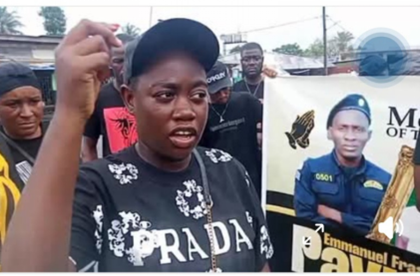The death of Liberian Drug Enforcement Agency (LDEA) officer Emmanuel Payne has sparked outrage and protests in Caldwell, Montserrado County, Liberia. Family members, demanding justice for his brutal murder, accuse the government and the LDEA of inaction and a lack of thorough investigation. The incident, which occurred on July 22, 2025, has left the family grieving and demanding answers, refusing to bury Officer Payne until they receive a satisfactory response from the authorities.
The family’s frustration stems from what they perceive as a lack of initiative from the government. They claim that instead of conducting a proper investigation, the authorities have shifted the burden of information gathering onto them. Marcus Payne, the deceased officer’s elder brother, expressed the family’s embarrassment and frustration, highlighting the government’s apparent reluctance to take charge of the investigation. This perceived dereliction of duty has fueled their determination to seek justice for their slain relative. Their refusal to bury Emmanuel Payne serves as a potent symbol of their unwavering commitment to this cause.
Martha Payne, the grieving mother, paints a poignant picture of her son as a provider and protector. Her grief is compounded by the silence from government officials, none of whom have reached out to her since her son’s death. This perceived indifference has deepened her pain and strengthened her resolve to seek justice. The family’s planned protests at the LDEA headquarters and the U.S. Embassy underscore their desperation and their hope that international pressure might bring the attention and action they desperately seek. Mrs. Payne’s revelation about her son’s previous departure from the LDEA due to economic hardship adds another layer to the tragedy, highlighting the difficult choices faced by many young Liberians.
The official account of the incident paints a picture of a dedicated officer who was tragically caught in a volatile situation. According to the LDEA, Officer Payne, while off duty, noticed a suspicious individual and, acting on his training and instincts, attempted an arrest. The situation quickly spiraled out of control when the suspect called for backup from nearby gang members. Despite identifying himself as an officer, he was falsely accused of being a motorcycle thief, a common tactic used to incite mob violence. The LDEA’s account, however, fails to satisfy the family, who suspect a more sinister motive behind the killing.
The family alleges that the attack was orchestrated by a notorious drug kingpin, Franklin B. Feawoe, alias “Black Bottle.” They believe that Officer Payne was deliberately targeted to silence him, given his commitment to drug enforcement. This suspicion adds another layer of complexity to the case, raising questions about the potential involvement of organized crime and the possible compromise of law enforcement. The family’s call for international intervention reflects their lack of trust in the domestic investigative process.
The case of Emmanuel Payne highlights the precarious security situation in Liberia, particularly the challenges faced by law enforcement officers in combating drug-related crime. It also underscores the urgent need for a robust and transparent investigative process that can ensure accountability and build public trust. The family’s persistent calls for justice, their refusal to bury their loved one, and their planned protests serve as a stark reminder of the human cost of violence and the urgent need for effective law enforcement and judicial processes in Liberia. The silence from the government, as perceived by the family, further exacerbates the situation, fueling mistrust and demanding attention from international bodies. The case raises important questions about the effectiveness of the LDEA, the influence of drug cartels, and the overall security climate in the country.














